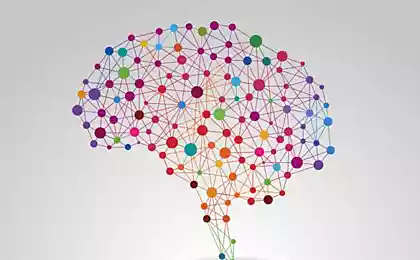458
Emotional intelligence: understand yourself
A stunningly small number of people able to feel what is happening to you, without words. And even that small amount — you probably think I do. Never to end. It seems to us that if you smile, it does not hurt. What is obvious and familiar to us — it is clear and acceptable to all that if you do not resist and do not ask — I understand and accept.
We are taught to fold and understand the terms, to be able to analyze and develop comprehensively. But most of us are not taught to analyze and understand their own emotions. And even the emotions of others, writes exclusively for the econet.ru Julia Petrovich.
Emotional intelligence — a term which will not teach you in school. It refers to the ability to manage their emotions and understand the emotions of others.
Sounds not bad, right?

The measurement of emotional intelligence is relatively new in the field of psychology, and the beginning of his learning was laid in the 80-ies. There are several models of foreign psychologists. We will consider the so-called "mixed model", developed by psychologist Daniel Goleman. The mixed model has five key areas:
1. Self-knowledge — the ability to recognize and understand their emotions. This includes accurate assessment of what you can do when you need help and what are your emotional triggers.
2. Self-regulation — this includes the ability to control your emotions when they become destructive. Self-management includes the ability to control the outbreak, to calmly discuss disagreements and avoid actions that undermine you as a long self-pity or panic.
3. Social skills — ability to build relationships with people, push them in the desired direction. As well as the skills of finding common positions with other management in a production environment and belief.
4. Empathy — the ability to consider the feelings of others when making decisions and the ability to empathize with other people.
5. Motivation — every action is motivated by rewards like money or status. Model Goleman, however, considers motivation as the engines of personal joy, curiosity and productivity.
I agree that these five areas are similar to the items to achieve "the best version of themselves"? And how are things in practice? Let's look at some practical advice on how to improve every area in your life.

How to improve self-awareness?
Have you ever sudden flash of anger, rudeness, euphoria, compassion? For sure. But how often have you wondered what caused these emotions? In fact, all reactions in our behaviour happens for a reason. Once you feel like you born with any emotion, try to take it apart to particles, to understand what caused it. Sounds simple, but these are regular questions to yourself will help you to understand yourself better.
And maybe one day you are rude to everyone around just because some one reason you pricked by anger. Maybe in this day you will smile at others and wink to his self-understanding.
How to improve self-control?
You can't always control what makes you feel a certain way, but you can always control how you react.
Zamedliteli:do emotions have a habit to get the most out of control when we don't have time to slow down or process them. The next time you have an emotional reaction to something, try to pause before reacting.
How to develop social skills?
Social competence takes many forms — and it's more than just talkativeness. These features range from the ability to tune into the other person's feelings to the experience of negotiating. All this teaches us life. We can improve any of the features but it takes time, effort, and perseverance.
You can start with the most common forms of social problems: dispute resolution. Before turning to solutions, make sure you and the other person agree to what problems actually exist. Offer solutions that are mutually beneficial, and show sympathy to any concessions that the other person may not want (but they must be confident in its independence).
How to develop empathy?
Shut up and listen. You can't experience the life of others, to understand them completely, but you can listen. The hearing involves the resolution of someone talking, and then not to oppose what they say. This means a little bit to put aside your preconceptions or skepticism and allow the person you are talking to, to give a chance to explain what they feel.
Try it: understanding is the key to empathy. If you find yourself saying, "I know, but ...", do it as an indicator that you should pause a bit more.
When someone tells you about an experience that is not your own, take some time thinking about how your life might be different if you experience it every day. Think about it until it clicks. It's okay if you don't spend all your time on someone else's life, because you learn empathy.
How to develop motivation?
We hear and read about it very much. However, when we talk about motivation related to emotional intelligence, we don't just want to get the energy to go to work. We're talking about your inner desire to achieve something.
Your goal is to build a career, raise a family or to do art. Everyone has something they want to do with my life.When your motivation works for you, it can be significantly erroneous. Want to become more attractive? Motivated people will start to invest time and money in your body and health. Want to improve your career? Motivated people will educate themselves to qualify for new jobs.
Daniel Goleman suggests that in order to begin to use the motivation, you first need to determine their own values. Many of us are so busy that time to study values just yet. Or, even worse, we're going to do the work, which directly contradicts the fact that we appreciate that, ultimately, will destroy our motivation.

Unfortunately, no one will give you the answer what you want in life. Fortunately, life itself has no purpose: make up whatever you want!
Emotional intelligence is to talk, to listen and hear. To understand and participate. To be judgmental. And then to be happy yourself and make others happy.
Author: Julia Petrovic, specifically for
P. S. And remember, just changing your mind — together we change the world! ©
Source: Julia Petrovich
We are taught to fold and understand the terms, to be able to analyze and develop comprehensively. But most of us are not taught to analyze and understand their own emotions. And even the emotions of others, writes exclusively for the econet.ru Julia Petrovich.
Emotional intelligence — a term which will not teach you in school. It refers to the ability to manage their emotions and understand the emotions of others.
Sounds not bad, right?

The measurement of emotional intelligence is relatively new in the field of psychology, and the beginning of his learning was laid in the 80-ies. There are several models of foreign psychologists. We will consider the so-called "mixed model", developed by psychologist Daniel Goleman. The mixed model has five key areas:
1. Self-knowledge — the ability to recognize and understand their emotions. This includes accurate assessment of what you can do when you need help and what are your emotional triggers.
2. Self-regulation — this includes the ability to control your emotions when they become destructive. Self-management includes the ability to control the outbreak, to calmly discuss disagreements and avoid actions that undermine you as a long self-pity or panic.
3. Social skills — ability to build relationships with people, push them in the desired direction. As well as the skills of finding common positions with other management in a production environment and belief.
4. Empathy — the ability to consider the feelings of others when making decisions and the ability to empathize with other people.
5. Motivation — every action is motivated by rewards like money or status. Model Goleman, however, considers motivation as the engines of personal joy, curiosity and productivity.
I agree that these five areas are similar to the items to achieve "the best version of themselves"? And how are things in practice? Let's look at some practical advice on how to improve every area in your life.

How to improve self-awareness?
Have you ever sudden flash of anger, rudeness, euphoria, compassion? For sure. But how often have you wondered what caused these emotions? In fact, all reactions in our behaviour happens for a reason. Once you feel like you born with any emotion, try to take it apart to particles, to understand what caused it. Sounds simple, but these are regular questions to yourself will help you to understand yourself better.
And maybe one day you are rude to everyone around just because some one reason you pricked by anger. Maybe in this day you will smile at others and wink to his self-understanding.
How to improve self-control?
You can't always control what makes you feel a certain way, but you can always control how you react.
Zamedliteli:do emotions have a habit to get the most out of control when we don't have time to slow down or process them. The next time you have an emotional reaction to something, try to pause before reacting.
How to develop social skills?
Social competence takes many forms — and it's more than just talkativeness. These features range from the ability to tune into the other person's feelings to the experience of negotiating. All this teaches us life. We can improve any of the features but it takes time, effort, and perseverance.
You can start with the most common forms of social problems: dispute resolution. Before turning to solutions, make sure you and the other person agree to what problems actually exist. Offer solutions that are mutually beneficial, and show sympathy to any concessions that the other person may not want (but they must be confident in its independence).
How to develop empathy?
Shut up and listen. You can't experience the life of others, to understand them completely, but you can listen. The hearing involves the resolution of someone talking, and then not to oppose what they say. This means a little bit to put aside your preconceptions or skepticism and allow the person you are talking to, to give a chance to explain what they feel.
Try it: understanding is the key to empathy. If you find yourself saying, "I know, but ...", do it as an indicator that you should pause a bit more.
When someone tells you about an experience that is not your own, take some time thinking about how your life might be different if you experience it every day. Think about it until it clicks. It's okay if you don't spend all your time on someone else's life, because you learn empathy.
How to develop motivation?
We hear and read about it very much. However, when we talk about motivation related to emotional intelligence, we don't just want to get the energy to go to work. We're talking about your inner desire to achieve something.
Your goal is to build a career, raise a family or to do art. Everyone has something they want to do with my life.When your motivation works for you, it can be significantly erroneous. Want to become more attractive? Motivated people will start to invest time and money in your body and health. Want to improve your career? Motivated people will educate themselves to qualify for new jobs.
Daniel Goleman suggests that in order to begin to use the motivation, you first need to determine their own values. Many of us are so busy that time to study values just yet. Or, even worse, we're going to do the work, which directly contradicts the fact that we appreciate that, ultimately, will destroy our motivation.

Unfortunately, no one will give you the answer what you want in life. Fortunately, life itself has no purpose: make up whatever you want!
Emotional intelligence is to talk, to listen and hear. To understand and participate. To be judgmental. And then to be happy yourself and make others happy.
Author: Julia Petrovic, specifically for
P. S. And remember, just changing your mind — together we change the world! ©
Source: Julia Petrovich
Macrobiotic diet will help to get rid of the desire to eat junk food
These seeds have a beneficial effect on the digestive and hematopoietic system























